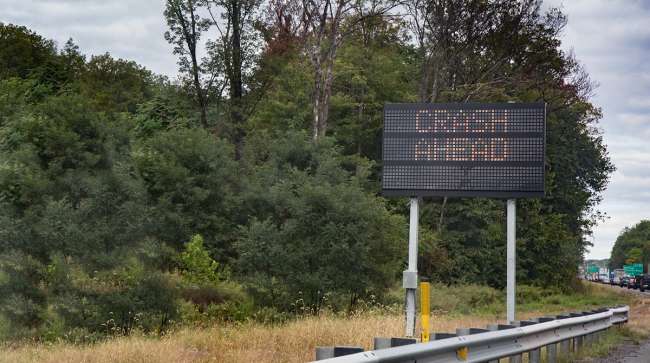Senior Reporter
FMCSA to Renew Plan for Carriers to Keep Accident Records

[Stay on top of transportation news: Get TTNews in your inbox.]
The Federal Motor Carrier Safety Administration has announced plans to renew its requirement that motor carriers maintain a record of accidents involving their commercial motor vehicles.
While the plan does not require carriers to report the accident data to the agency, it must produce it upon inquiry by authorized federal, state or local officials, FMCSA said Aug. 8 in a Federal Register announcement.
“This Information Collection Request supports the Department of Transportation strategic goal of safety,” FMCSA said. “By requiring motor carriers to gather and record information concerning commercial motor vehicle accidents, FMCSA is strengthening its ability to assess the safety performance of motor carriers. This information is a valuable resource in agency initiatives to prevent, and reduce the severity of, CMV crashes.”
The agency is seeking public comment on its plan on or before Oct. 10. The plan must be approved by the White House Office of Management and Budget before becoming final.
The accident record-keeping requirements include the date, location, driver name, number of injuries, number of fatalities and whether certain dangerous hazardous materials were released. If a crash involves the release of hazardous materials, carriers must complete a hazardous incident report, according to FMCSA records.
“In addition, the motor carrier must maintain copies of all accident reports required by insurers or governmental entities,” the announcement said.
Generally, the record-keeping information may be requested in the event of a carrier audit by the agency. Motor carriers must maintain the information for three years after the date of an accident.
The agency said the accidents that must be included in the motor carrier’s record are those that result in a fatality, bodily injury to a person with an injury that immediately receives medical treatment away from the scene of the accident, or one that results in motor vehicles incurring disabling damage that requires transport away from the scene by a tow truck or other motor vehicle.

Horvath
“This is something fleets are doing today,” said Dan Horvath, vice president of safety policy for American Trucking Associations. “The question is does it need to continue or not. We don’t have a stance on it one way or another.”
However, Horvath said the practice is relatively standard for motor carriers, either for DOT or their own use.
“Insurance companies often require fleets to keep a list of accidents they’ve had,” he said. “Frankly, a lot of motor carriers out there today keep track of all kinds of accidents such as a backing incident at a dock versus a crash that involves another vehicle out on the highway.
“It’s good information from a safety perspective for a fleet to have, whether it’s part of their safety management system — where the fleet has areas for improvement.”
There was only one commenter on the requirement when the most recent renewal was requested by the agency in 2019: the National Motor Freight Traffic Association, an Alexandria, Va., nonprofit membership organization representing approximately 500 motor carriers primarily specializing in the movement of less-than-truckload quantities of freight.
Want more news? Listen to today's daily briefing above or go here for more info
NMFTA said it presents its members’ position in relevant judicial, regulatory and legislative proceedings.
“Five years ago, in response to the question of whether this information collection will have practical utility, NMFTA suggested that FMCSA more effectively utilize police accident reports, which can contain reliable information regarding a carrier’s fault, or lack thereof, for an accident.
“FMCSA will benefit from greater use of accident information, such as police accident reports, that support greater accuracy and fairer portrayal of a carrier’s safety practices. FMCSA could more effectively use its enforcement resources if it can better identify motor carriers who bore responsibility for commercial motor vehicle accidents.”




